• One of the research lines of the HAPPY PATIENT European project is to develop a strategy to improve communication between professionals and patients.
• As the celebration of the European Day for the Prudent Use of Antibiotics approaches on November 18, it is worth remembering that the adequacy of the use of antibiotics is the best strategy to fight against antibiotic resistance.
• Funded by the European Union, HAPPY PATIENT (The Health Alliance for Prudent Prescription and Yield of Antibiotics from a Patient-Centred Perspective) is led by the Catalan Health Institute (ICS) and the IDIAPJGol Research Institute; and has the presence of professor Lars Bjerrum and research assistant Athina Chalkidou, Centre for General Practice as the persons in charge of the Work Package creating material for the interventions.
A total of 406 participants will attend the intervention meetings of the HAPPY PATIENT European project on how to use antibiotics more appropriately and how to improve communication skills and will have the opportunity to discuss the results of the first audit. All participants will be able to use all the tools that the experts have developed. Experts from five European countries (Spain, Greece, France, Poland, and Lithuania) have participated in a DELPHI study to develop a set of communication tools to achieve the prudent use of antibiotics. The idea is to keep health professionals and patients informed and improve communication. The materials are limited to the work of the HAPPY PATIENT European project, and are available in different languages and provide reliable, useful, and contrasted information on antimicrobial resistance (AMR) and prescription. The HAPPY PATIENT project aims to reduce the unnecessary prescription of antibiotics in 5 countries of the European Union with worrying levels of consumption. To achieve this, the consortium is developing various interventions with health professionals with various levels of care in the continent where these drugs are prescribed (Primary Care, Primary Care Emergency Services, Nursing Homes, and Community Pharmacies).
In this first phase of the project, Lithuania and Spain have been the ones that have contributed the most participants, 105 in the case of the Baltic country and 109 in the case of Spain. Poland is closely following 80 participants. France, with 58, and Greece, with 54, close the list.
By medical specialties, family doctors or general practitioners have so far participated 146, almost 40% of the total, community pharmacies with about 30% of participants, and, finally, the rest of the levels of care involved have been the emergency services of the first level of care and nursing homes (30%).
The first audit of the HAPPY PATIENT project took place between February 2022 and May 2022. Previously, a qualitative study was carried out (September 2021- February 2022) for the development of communication tools. To optimize the results and achieve the objectives, the HAPPY PATIENT consortium used an adaptation of the DELPHI methodology, where a panel of experts prioritized predefined misconceptions regarding the use of antimicrobials.
This methodology, which includes feedback and dialogue between the different experts, resulted in the messages to be used in the communication tools developed in HAPPY PATIENT.
The data that HAPPY PATIENT is collecting has already revealed a large part of the challenges faced by European health professionals when it comes to prescribing antibiotics. Therefore, these communication tools try to resolve doubts based on the evidence collected so far. Based on these differences and peculiarities, the University of Copenhagen (Denmark) and the Spanish Society of Family and Community Medicine, together with the rest of the consortium, have been responsible for formatting the communication materials that are now presented, on the occasion of the European Day for the Prudent Use of Antibiotics.
The 6 HAPPY PATIENT communication materials
The new materials address the doubts and problems that may exist at different levels of care, from Primary Care to Nursing homes through Pharmacies, and offer very useful knowledge guides specially designed for use by professionals who carry out their activity in each one of these areas.
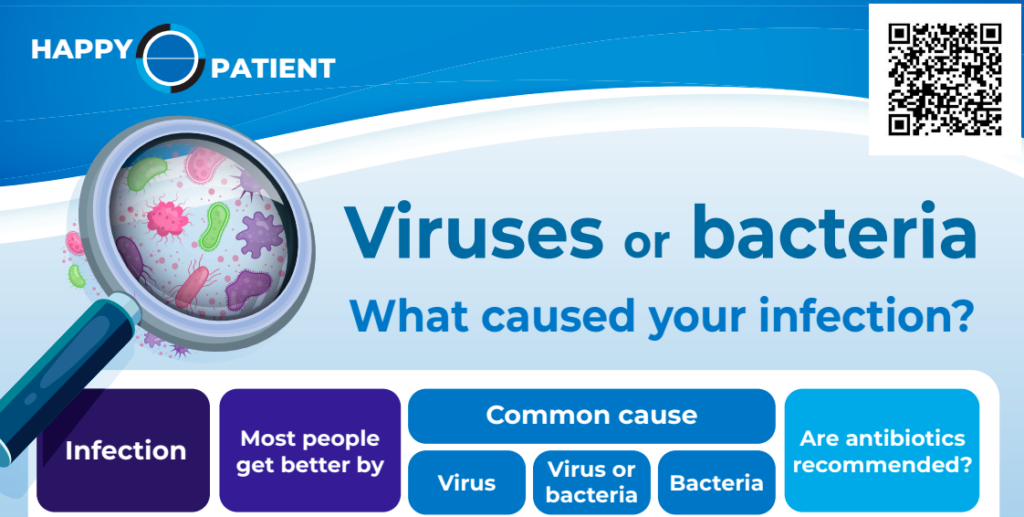
HAPPY PATIENT Leaflet Viruses or bacteria: What caused your Infection?
In this leaflet, the information is available to everyone in a visual and practical way.
With a simple and easily searchable table, it is possible to see the type of Infection, the possible common cause, and if the antibiotics would be adequate to treat that infection or not.
You can download the document here [+]
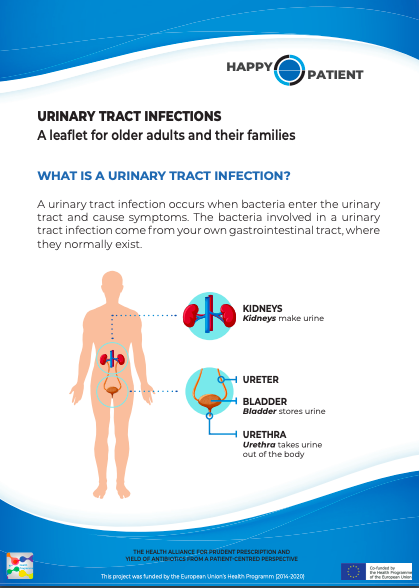
HAPPY PATIENT Urinary tract infections: A leaflet for older adults and their families
This leaflet visually and attractively summarizes what a urinary tract infection is and how to prevent or treat it. It is especially aimed at the population in nursing homes in order to adequately inform residents and family members. The document visually and attractively summarizes what needs to be done to prevent and manage them.
You can download it here [+]
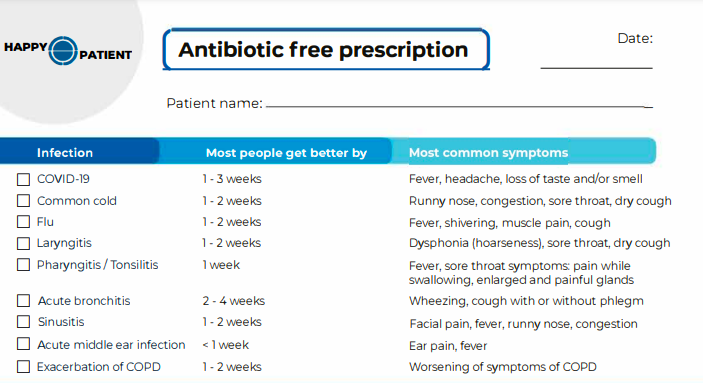
HAPPY PATIENT Antibiotics Prescription Pad
The non-antibiotic prescription pad is another innovative material that HAPPY PATIENT publishes. The idea is that the family doctor or the prescriber, in general, can use it in the consultation, in the pharmacy, in nursing homes, or in Primary Care emergency services.
This prescription is designed to be used by the prescriber and replaces the antibiotic prescription.
Thus, the patient leaves the consultation with clear instructions on how to manage their infection, including their symptoms.
You can download it here [+]
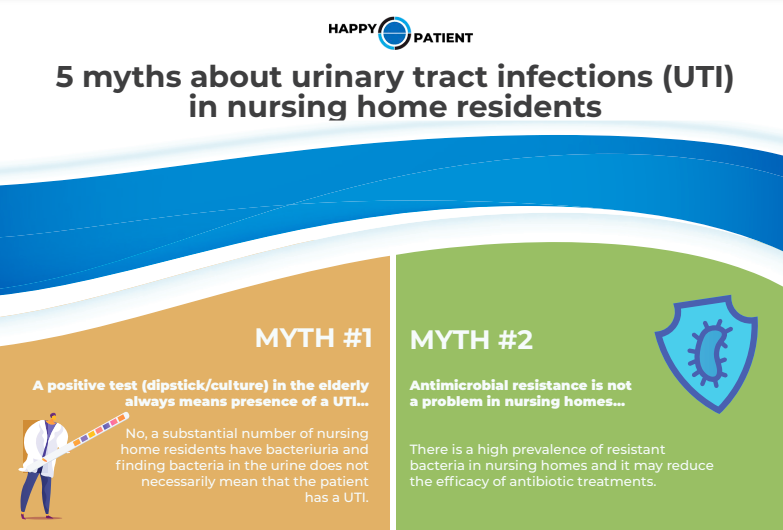
HAPPY PATIENT 5 Myths About Urinary Tract Infections in Nursing Homes
The document collects five frequent ideas that include the typical symptomatology of urinary tract infections and screening tests and wants to refute some of the misconceptions about the use of antibiotics in institutionalized patient nursing homes.
You can download it here [+]
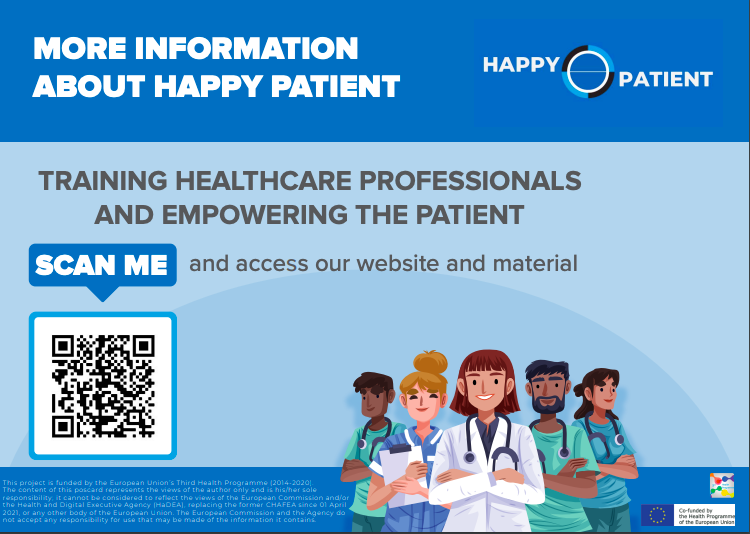
Eight visual information cards
The 8 HAPPY PATIENT cards provide the patient with a set of easy-to-understand messages to explain microbial resistance, the side effects of taking antibiotics when they are not necessary, and how to consume them correctly.
You can download this document here [+]
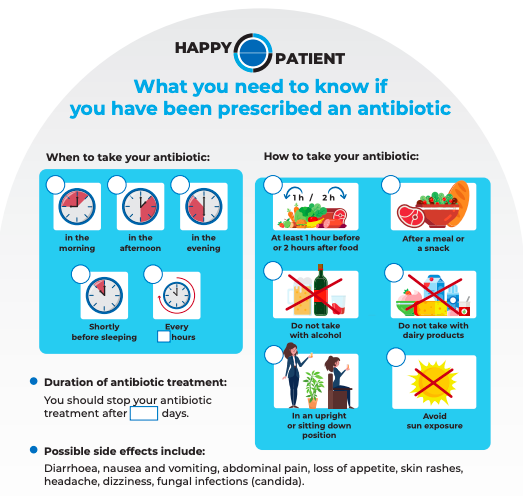
What you need to know if you have been prescribed an antibiotic
Finally, given the case in which an antibiotic has been prescribed, this document offers the patient all the summarized information about the need to consume antibiotics responsibly.
In the document, it is possible to indicate the duration of the treatment, and the advice and the procedure to follow for its correct use, as well as its secondary effects, are put into context.
You can download this document here [+]
Translated into the languages of the four target countries in which the most antibiotics are prescribed (Spain, France, Greece, Poland) and also Lithuania (which is taken as the reference country for prescription levels), the HAPPY PATIENT communication tools deal with topics as elementary as the differences between viral and bacterial infections; but they also review myths about urinary tract infections; or what a patient should know when an antibiotic is prescribed.
Considering the truth of the topics discussed, these tools are aimed at both health professionals and patients, and the general public. The final objective of this work is to prevent up to 40% of the arbitrary and massive prescription of antibiotics at the different levels of care since this erroneous prescription is the main generator of bacterial resistance.
Those responsible for HAPPY PATIENT state that «after two decades of effort to address the growth of antimicrobial resistance (AMR), the urgency of the problem is now even greater.» The inappropriate use of antibiotics is the main driver of the development and the «increasing spread of antimicrobial resistance. The next pandemic will be superbug infections against which modern medicines will not be effective, and we must prevent this.»
Taking into account that the World Health Organization has warned that many of the medicines that work today will cease to be effective in the coming years if the use and prescription of antibiotics are not rationalized at all levels of health care, HAPPY PATIENT is one of the key investments of the European Union to stop this trend.
This is the first project of these characteristics that includes all levels of care and all health professionals, so its final results, which will be published in approximately one year, are expected to be especially relevant.
Likewise, the quality and usefulness of the communication materials that the consortium has made available openly through the project’s digital platforms, website, and social channels.
At the moment, up to 406 professionals have already been part of HAPPY PATIENT.
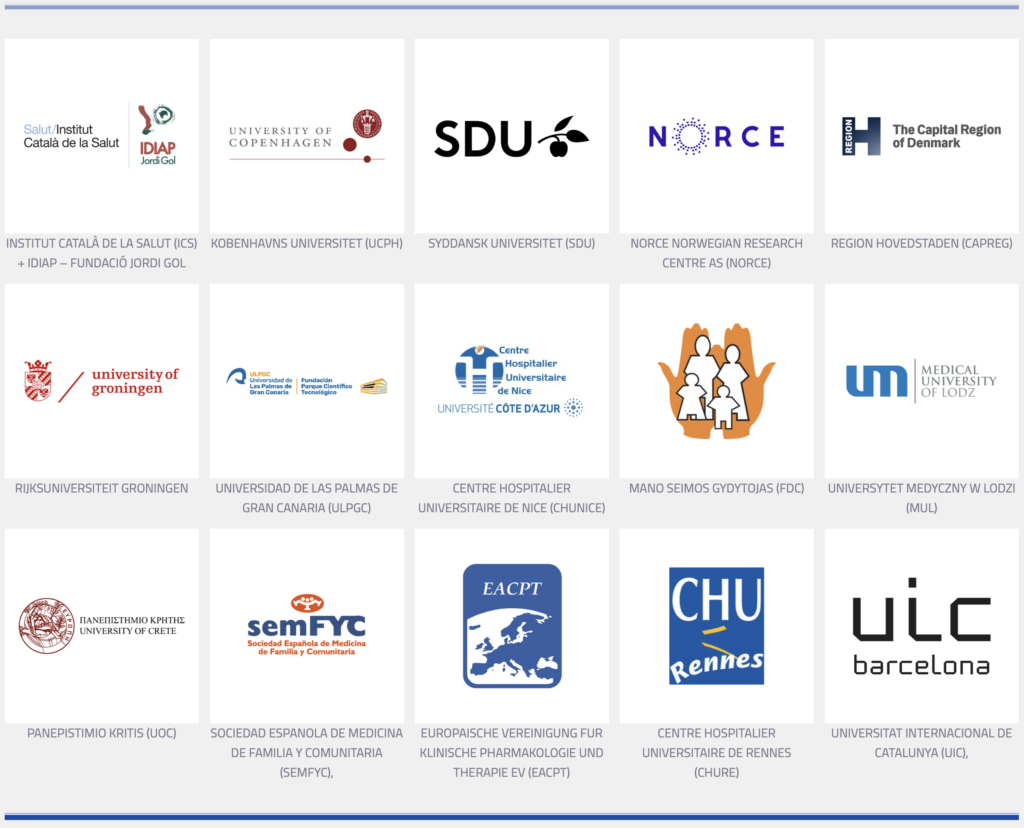
The partners of the HAPPY PATIENT consortium
The Happy Patient Project Consortium is made up of the Institut Català de la Salut (ICS) & IDIAPJGol Research Institute, University of Copenhagen (UCPH), University of Southern Denmark (SDU) and its Odense General Practice Research Unit (RUPO), Norwegian Research Center (NORCE), Capital Region of Denmark, Rijksuniversiteit Groningen (RUG), University of Las Palmas de Gran Canaria (ULPGC) and Fundación Canaria Science and Technology Park (FCPCT), University Hospital of Nice (CHU of Nice), My Family Doctor (Mano Seimos Gydytojas), Medical University of Lodz (MUL) ), University of Crete (UoC), Spanish Society of Family and Community Medicine (SEMFYC), European Association of Clinical Pharmacology (EACPT), Center Hospitalier Universitaire de Rennes (CHU Rennes) and International University of Catalonia – Patients Institute (UIC).





